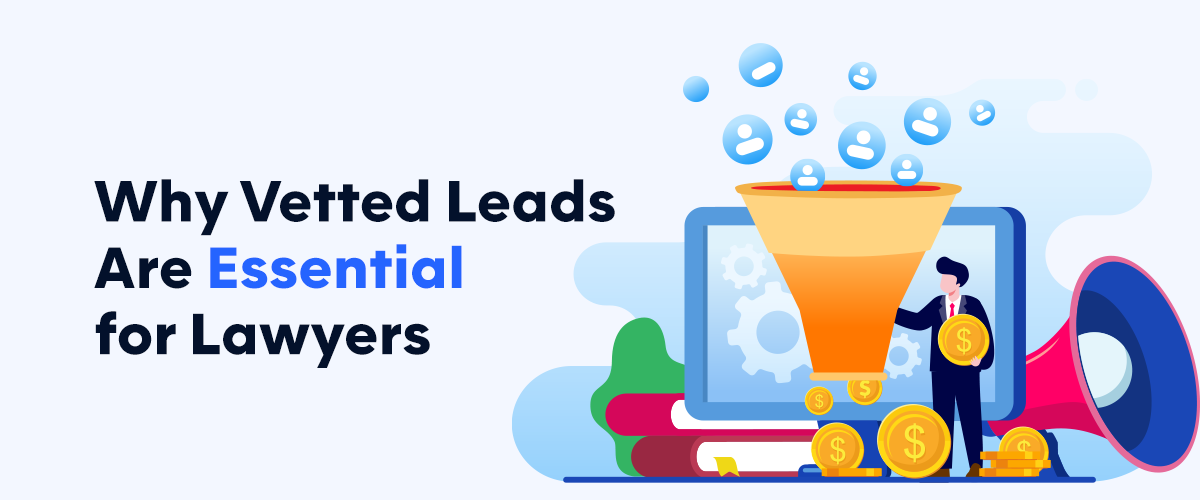Why Vetted Leads Are Essential for Lawyers

Introduction
In the constantly evolving legal industry, lawyers often struggle to find quality clients who are more likely to convert into long-term engagements. With this in mind, this article explores the concept of vetted leads and highlights their importance in the legal profession. By focusing on lead-generation strategies that prioritize screening potential clients, lawyers can streamline their efforts and enhance their legal practice.
Main Reasons for Vetted Leads
There are many good reasons that personal injury law firms benefit from using pre-qualified leads instead of digging through lists that may not match their areas of expertise. These include:
1. Increased Efficiency
Vetted leads enable lawyers to concentrate their time and resources on potential clients who have already been screened and qualified. This allows for a more efficient allocation of resources, ensuring that lawyers can provide personalized attention to individuals with a higher likelihood of conversion. By targeting these vetted leads, lawyers can better manage their caseloads and maximize their efficiency.
2. Improved Conversion Rates
The process of vetting leads helps identify prospects who are more likely to turn into paying clients. By screening potential clients based on predetermined criteria, lawyers can pinpoint prospects who align with their practice areas and expertise. Focusing their efforts on these individuals allows lawyers to significantly improve their conversion rates and achieve greater business success.
3. Time and Cost Savings
By investing in vetted leads, lawyers can save valuable time and money that would otherwise be spent on pursuing unqualified leads. The initial screening process filters out individuals who may not be the best fit for a lawyer's services, ensuring that resources are optimally allocated. This optimization of resources can lead to higher profitability and a better return on investment for lawyers. It also frees up staff resources that would otherwise go toward sifting through client lists and screening potential clients before casework begins.
The Process of Vetted Leads
Vetting leads can be time-consuming, especially if your firm has limited staffing resources or is juggling multiple caseloads. By outsourcing the initial screening process to an agency like Legal Growth Marketing, this process comes off your plate, and prospects come to you ready to work with.
1. Initial Screening
The vetting process begins with an initial screening to identify potential clients who meet specific pre-determined criteria. This step helps narrow down the pool of prospects and ensures that lawyers focus their time and energy on individuals who are more likely to become clients. By undertaking this initial screening, lawyers can eliminate unqualified leads early on.
2. Qualification Criteria
After the initial screening, attorneys can establish specific qualification criteria to further evaluate potential clients. Factors such as legal needs, budget, and fit with the lawyer's expertise are considered at this stage. By carefully considering these criteria, lawyers can prioritize their efforts and pursue leads that align with their practice areas, increasing their chances of successful engagements.
3. Follow-up and Engagement
After the leads have been vetted and qualified, lawyers engage with them through follow-up communication. This stage allows lawyers to build relationships, address any concerns, and provide relevant information to further solidify the potential client's decision to engage their services. By nurturing these relationships, lawyers can cultivate trust and increase the likelihood of successful engagements.
The Benefits of Vetted Leads
1. Higher Quality Clients
Vetting leads ensures that lawyers attract high-quality clients who are more likely to have a positive experience with their services. This can lead to better outcomes, increased client satisfaction, and potential referrals. By focusing on vetted leads, lawyers can establish a reputation for delivering exceptional services, attracting more high-quality clients in the process.
2. Increased Revenue
By concentrating on vetted leads, lawyers can improve their conversion rates and bring in more paying clients. This ultimately leads to increased revenue and better financial stability for their legal practice. By capitalizing on the higher conversion rates associated with vetted leads, lawyers can achieve greater financial success in their respective fields.
3. Enhanced Reputation
Working with vetted leads not only brings financial benefits but also enhances a lawyer's reputation within the legal community. Satisfied clients who have obtained positive outcomes from their engagements are more likely to share their experiences and recommend the lawyer to others. This reputation-building can lead to increased referrals and further solidify the lawyer's trusted and effective practitioner status.
Common Challenges and Solutions
Finding pre-qualified leads isn’t as simple as buying a list of contact info or signing with the first referral service to come up on Google. Buying a static list of leads might result in cases that are outside the statute of limitations, outside your state of practice, or in other ways, aren’t qualified for you to work with.
1. Identifying Trustworthy Lead Generation Sources
One of the challenges lawyers face is finding reliable sources for vetted leads. To overcome this, lawyers can explore reputable platforms and networks that provide lead generation and screening services. Seeking recommendations from trusted colleagues in the legal industry can also help identify trustworthy lead-generation sources. Ideally, this approach combines organic reach, paid lead generation, and intake automation.
2. Managing the Volume of Leads
Another challenge involves managing the influx of leads that vetting can generate. Implementing systems and processes to efficiently handle and prioritize leads can prevent lawyers from becoming overwhelmed. By establishing workflows and using a platform that helps you sort through leads, lawyers can ensure that no potential clients fall through the cracks.
3. Building and Maintaining Relationships
Vetted leads still require nurturing and relationship-building efforts. Lawyers must establish and maintain open lines of communication with potential clients to cultivate trust and increase the chances of successful engagements. Timely follow-up, consistent communication, and personalized attention are crucial in building long-lasting relationships.
Conclusion
Vetted leads offer numerous advantages for lawyers, including increased efficiency, improved conversion rates, and time and cost savings. By understanding the benefits and implementing effective lead generation strategies, personal injury lawyers can enhance their legal practice, attract higher quality clients, and achieve greater success in their respective fields. The importance of vetted leads should not be underestimated, as they serve as a valuable tool for lawyers to thrive in an increasingly competitive legal market.



